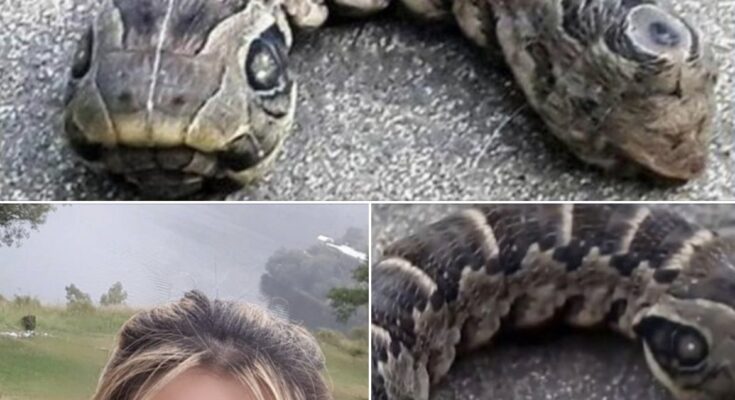In the quiet town of Santa Fe in Argentina, 46-year-old Lujan Eroles experienced a moment of shock and awe when she stumbled upon a peculiar creature in her garden.
What she initially mistook for a snake turned out to be a fascinating example of nature’s mimicry – a 10-centimeter-long creature disguised as a serpent.
Lujan Eroles recounted the moment she made the startling discovery, describing how her immediate reaction was to scream.
The unusual creature, with snake-like features and peculiar eyes, had captured her attention, prompting neighbors to gather and witness the peculiar spectacle.
Eroles shared her amazement, telling National Geographic: “I have never seen anything like it. It was just like a snake and its eyes were so strange”.
”I looked down and I encountered the strange animal, fear struck me knowing that it could have been poisonous”, she said.
”We all thought it was a mutant animal, which is why we filmed it and put it online for people to give us their opinions.”
It looked like a snake, but his eyes were strange. I was afraid it was poisonous.” The fear of encountering a potentially venomous creature heightened the intensity of the moment, and Eroles quickly realized that this was no ordinary find.
Seeking answers and eager to share her extraordinary encounter, Eroles posted a video of the bizarre caterpillar on the internet.
The footage quickly gained attention, sparking discussions and speculations about the creature’s identity and origin. The snake-like appearance, as well as its relatively small size, intrigued online communities, leading to a series of revelations about its true nature.
As the online community flocked to Eroles’ video, experts and enthusiasts weighed in on the identity of the enigmatic creature.
It was eventually identified as a caterpillar belonging to a rare species of moth native to Central America. The creature, which many believed was an Elephant Hawk-Moth Caterpillar, even had a remarkable defense mechanism – it mimics the appearance of a snake to deter potential predators.
It sports two large “eye markings” behind its head, fooling predators into perceiving it as larger than its actual size.

The snake-like caterpillar, lacking conventional defensive weapons, uses mimicry as a survival strategy.
By imitating the appearance of a snake, a creature often associated with danger and venom, the caterpillar deters predators from making it their prey. This evolutionary adaptation showcases the ingenious ways in which species have evolved to protect themselves in their respective ecosystems.
Lujan Eroles’ chance encounter with the snake-like caterpillar not only intrigued her and her neighbors, it also shows us the fascinating and rich biodiversity that exists in the natural world.
The uniqueness of this caterpillar’s mimicry offers a glimpse into the complex and adaptive strategies that organisms employ for their survival.

What did you think about this unique and amazing creature? Let us know in the comments!



